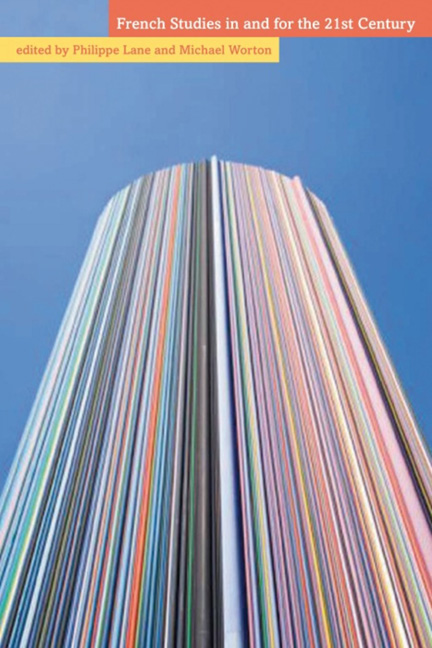Book contents
- Frontmatter
- Contents
- Notes on Contributors
- Foreword
- Foreword by His Excellency
- Part I: Contextualisations
- 1 Introduction
- 2 A Short History of French Studies in the UK
- Part II: Research and Public Engagement Strategies
- Part III: The Place of Women and Gender in French Studies
- Part IV: The Place of Literature
- Part V: The Place of Linguistics in French Studies Today
- Part VI: Theatre, Cinema and Popular Culture
- Part VII: Area Studies, Postcolonial Studies and War and Culture Studies
- Part VIII: Adventures in Language Teaching
- Appendices. Addresses to the Future of French Studies Conference
2 - A Short History of French Studies in the UK
from Part I: Contextualisations
- Frontmatter
- Contents
- Notes on Contributors
- Foreword
- Foreword by His Excellency
- Part I: Contextualisations
- 1 Introduction
- 2 A Short History of French Studies in the UK
- Part II: Research and Public Engagement Strategies
- Part III: The Place of Women and Gender in French Studies
- Part IV: The Place of Literature
- Part V: The Place of Linguistics in French Studies Today
- Part VI: Theatre, Cinema and Popular Culture
- Part VII: Area Studies, Postcolonial Studies and War and Culture Studies
- Part VIII: Adventures in Language Teaching
- Appendices. Addresses to the Future of French Studies Conference
Summary
Preamble
In October 1999 the journal French Cultural Studies brought out an original and engaging special issue entitled ‘Personal Voices, Personal Experiences’. It was composed of eight essays by academics of different backgrounds and generations, each working in some aspect of French Studies, all but one within the UK, and it put the emphasis on autobiographical trajectories, on how each had come to choose French as their discipline and its teaching and study as their career. Brian Rigby, the volume's editor, commented in the introduction on how little has been written on the development of French as an academic discipline, and on the paucity in such accounts as do exist of any ‘traces of the personal and autobiographical’. ‘It is as if studying a foreign language and culture – as opposed to one's native language and culture – demands the repression of the scholar and critic's own personal, social, linguistic and cultural identity.’
This is not an autobiographical account of my own engagement with French Studies, but rather an attempt to frame the chapters that follow within a history that has seen massive change, and a fair amount of continuity, linear development, and cyclical patterns of decline and renewal. However, Brian Rigby's statement chimes with my own recognition as I prepared this paper that any history was going to be shaped by personal experience: my sense of what French means to British people, of how it is classed and gendered, as well as my examples of particular universities that seem to illustrate a broader tendency – these are inevitably determined in part by an individual story, which should therefore be briefly acknowledged.
In the 1960s I was at school in a Lancashire town with a large Catholic population, where Catholic and what we called ‘non-Catholic’ educational systems ran in parallel: passing the 11-plus, as a Catholic girl, meant going to Notre Dame Convent Grammar. The nuns’ real ambition for us – at least that was our impression – was that we should become good pious wives and mothers, but languages were encouraged and relatively well taught. They were considered feminine subjects.
- Type
- Chapter
- Information
- French Studies in and for the 21st Century , pp. 12 - 24Publisher: Liverpool University PressPrint publication year: 2011



